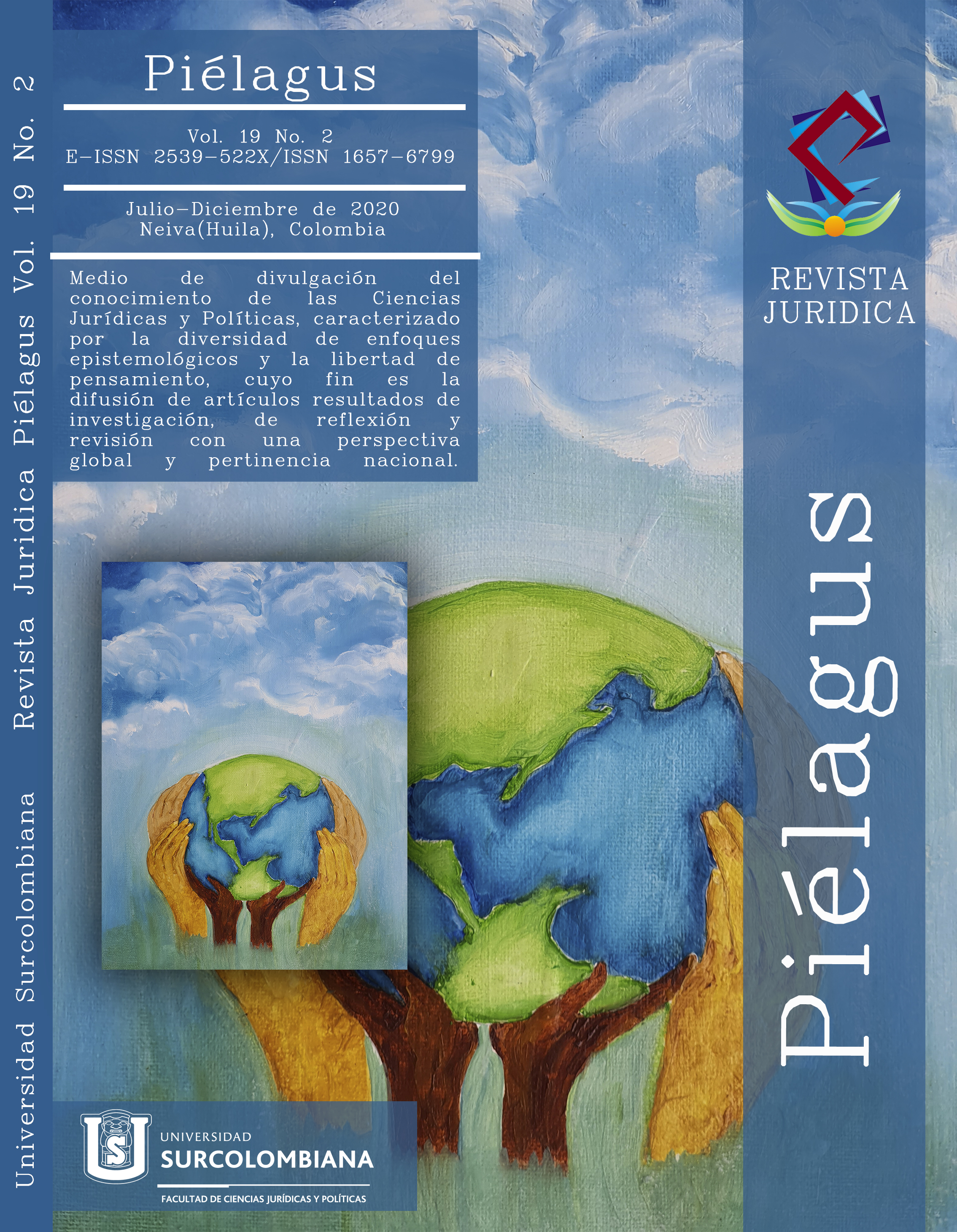The consent in criminal court. Proposals for regulation
##plugins.themes.bootstrap3.article.main##
The problem that today generates the inexistence of a unanimous opinion referred to the penal consent, that in some way commands that the penal normative bodies declare it or accept it in an express way in their text; and the real existence of a cognitive gap in our country related to our object of study, motivate this investigation. From the systematization of the theoretical assumptions that support it, its foundation as a cause of atypicality, justification or mitigation of the criminal sanction and the study of comparative law, such deficiencies are identified. The main result is a proposal for the regulation of the institution in the criminal court, in order to guarantee the security and certainty of the legal traffic.
Downloads
##plugins.themes.bootstrap3.article.details##
ABASCAL VERA, Horacio. El Juramento Hipocrático. Recuperado de https://www.bvs.sld.cu. /revistas/his/cua_87/cua1087.htm. [Fecha de consulta 10/04/2019].
ALLER, German. (sf). Aspectos penales acerca del consentimiento. Recuperado de https://wol.jder.edu.vy/contenido/penal/pdf/2010/consentimiento.pdf.[Fecha de consulta 08/01/2019].
BUSTAMANTE GONZÁLEZ, (2001). Irene Catalina. “La relevancia del consentimiento de los jóvenes mayores de 14 años y menores de 18 años en el delito sexual de estupro. Recuperado de http://www.pensamientopenal.com.ar/system/files/2016/01/doctrina42797.pdf. [Fecha de consulta 10/04/2019].
BUSTOS, Juan. (1997). Lecciones de Derecho penal. Vol. I, II.
CAMILO MOMBLANC, Liuver. (2014).El error de prohibición en la legislación penal cubana. Tesis presentada en opción al título académico de Especialista en Derecho Penal. Facultad de Derecho. Departamento de Derecho. Universidad de Oriente. República de Cuba.
COBO DEL ROSAL & VIVES ANTÓN. (1996). Instituciones de Derecho penal español. Parte general.
CREUS, Carlos. (1992). Derecho penal parte general. Disponibles ambos en poder de la autora.
CREUS, Carlos. (2004). Derecho Penal Parte General.
CUELLO CONTRERAS. El Derecho Penal Español. Parte General.
DARÍO JARQUE, Gabriel. La relevancia penal del consentimiento. Recuperado de https://www.unifr.ch/ddp1/derechopenal/articulos/a-20111108-01.pdf. [Fecha de consulta 10/04/2020].
DE LA GÁNDARA VALLEJO, Beatriz. (1995). Consentimiento, bien jurídico e imputación objetiva.
DICCIONARIO DE LA LENGUA ESPAÑOLA - REAL ACADEMIA ESPAÑOLA. VIGÉSIMA SEGUNDA EDICIÓN. (2001).
DOMÍNGUEZ CORREA, Marcelo. El consentimiento del ofendido: ente la justificación y la exclusión de la tipicidad. Recuperado de https://wold.fder.edu.vy/contenido/penal/pdf/art2011/dominguez-consentimiento- ofendido-pdf. [Fecha de consulta 10/04/20120].
FONTANA BALESTRA, Carlos. (1998).Derecho Penal.Introducción y Penal General. Actualizado por Guillermo A. C. Ledesma. Buenos Aires, Argentina: Abeledo-Perrot.
GEERDS,Friedrich.(1953).EinwilligungundEinverständnisdesVerletzten.Consentimientoyacuerdoenlas lesiones.
GÓMEZ ALLER, Jacobo Dopico. (2010). Problemas del consentimiento informado por representación. Disponible en http://webcache.googleusercontent.com/search?q=cache:XdUxTZR2q0MJ:e-archivo.uc3m.es/bitstream/handle/10016/11435/problemas_dopico_2010.pdf%3Fsequence%3D1+&cd=9&hl=es&ct=clnk&gl=cu. [Fecha de consulta 10/04/2020].
HONIG, Richard. (1919). Die Einwilligung des Verletzten.Parte I. Geschichte und Methodenfrage.
JIMÉNEZ DE ASÚA, Luis. (1977). Tratado de Derecho Penal. Tomo VI. Buenos Aires.
MACHADO RODRÍGUEZ, Camilo Iván. El consentimiento en materia penal. Recuperado de https://revistas.uexternado.edu.co/index.php/derpen/article/view3419/3106. [Fecha de consulta 08/01/2020].
MAURACH, Reinhart. (1994). Derecho Penal: Parte General. Vol. 1.
MIR PUIG, Santiago. Derecho Penal. Parte General. Parte General (4º ed.). Barcelona:
TECFOTO.
MOMMSEN, Theodor. (1898). Derecho Penal romano.Charlottenburgo: [s.e].
PLASCENCIA VILLANUEVA, Raúl. (2004). Teoría del delito.
POLAINO-ORTS, Miguel. (2004). Alegato a favor de un tratamiento jurídico-penal unitario para los casos de acuerdo y consentimiento como causas de atipicidad (163/204) Cuadernos de Política Criminal.
POLAINO-ORTS, Miguel. ¿Volentinonfitiniuria?Sobreladiscutibledistinciónentreacuerdo yconsentimientoen DerechoPenal.
QUINTERO OLIVARES, Gonzalo. (2004). En dónde va el Derecho Penal. Reflexiones sobre las leyes penales y los penalistas españoles.
QUIRÓS PIRÉZ, Renén. (2006). Manual de derecho penal I, II, III.
RÍOS ARENALDI, Jaime. (2006). El consentimiento en materia penal. Política criminal. nº 1. p. 5. Recuperado de https://www.politicacriminal.cl/n-01/a.6pdf. [Fecha de consulta 08/01/2020].
ROXIN, Claus. Derecho penal parte general. (1992). Editorial Civilitas.
ROXIN, Claus. (1997). Derecho penal general. Fundamentos. La estructura de la teoría del delito.
VALDÉS DÍAZ, Caridad del Carmen, (2010). Requisitos del contrato En Colectivo de autores. Derecho de contratos. Teoría general del contrato. T 1.
VITAL DE ALMEIDA, Ricardo. (2006). El consentimiento y su relevancia para la teoría jurídica del delito. Recuperado de https://hera.ugr.es/tesisugr/16430190.pdf. [Fecha de consulta 10/04/2020].
VON HIPPEL, Robert. (1930). DeutschesStrafrecht.T 2. Das Verbrechen. AllgemeineLehren.
WELZEL, Hans.(1956). Derecho Penal: Parte General. Disponible en poder de los autores.
ZAFFARONI, Raúl Eugenio. (2000) Derecho Penal Parte General T III.
ZITELMANN, Ernst. (1906). Ausschluß der Widerrechtlichkeit.Archivfür die civilistische Praxis. T 99.




 Perfil Google Scholar
Perfil Google Scholar













